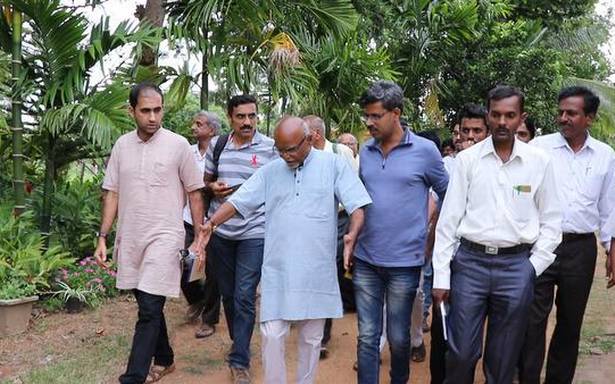ART NEWS
Making the right collaborations
Native Circle is a platform that believes in creating a meaningful intervention between the farmer and the consumer. It has also entered the world of education to make a definitive impact on the local and indigenous
When India has abundant resources, why are its people struggling for access to natural foods? What makes farmers hopeless? Why is it that students of Bio-science have no practical solutions to offer? These questions bothered Mahesh Hegde, a former consultant based in Bengaluru. It compelled him to study the practical difficulties of the agricultural sector in the State. His weekends thereafter were devoted to field works during which he met hundreds of farmers, experts in forest produce, medicinal plants and food processing. What began as a personal quest for Mahesh ended up in founding an organisation — Native Circle. Native Circle, is 18 months old, it connects farmers and small agri-businesses to the on-going research and best practices in the respective fields and provides institutional support whenever necessary.
Bridging gapsRecollecting his fieldwork findings, Mahesh explains: “We felt that education and training at the grassroots level and sensitising agriculture graduates to the working of sustainable and indigenous systems were necessary in the Indian scenario.” The group then began rigorously working on these fronts by providing value-addition and technical services to farmers, as also offering workshops and internships to university graduates. “We support interested farmers in processing, product development, packaging and marketing. We also provide technical know-how in setting up agro-processing facilities, getting licences and even in aspects of e-commerce. Lastly, we invite students and young entrepreneurs who wish to work in the areas of sustainable production and consumption to intern with us.”Within a few months of Native Circle’s intervention, they began to notice change. Social entrepreneurs who attended their trainings and workshops began to think about ‘sustainable development’, there were others who got ideas for farming, while farmers acquired clarity on food security.“Native Circle’s e-commerce is designed in such a way that every person in the production chain gets his/her share whenever a product is sold. This has provided many families dependent on farming a secondary income of about five thousand a month.” In some of the clusters, farmers have voluntarily formed groups and are working together towards common goals. “This itself is a sign of comfort and hope for the future,” opines Mahesh.Addressing hurdlesThe positive impacts were of course not bereft of challenges. “Our products were not welcomed by Ayurvedic practitioners initially. Since our products had no chemical preservatives they feared it would not last long,” he recollects. Whether it was about reducing the use of plastic or build trust in farmers, a standard protocol had to be developed. After much research and thought, Native Circle now boasts of a template that is up and running.In the second phase, the firm began providing training and technical assistance to rural and urban start-ups working in the agro-food sector. Graduates not only from the biological sciences but also from other disciplines have approached Native Circle to seek assistance in finding their way back to the roots.
“The main motto has been to conserve indigenous knowledge systems by preserving native species, methods and practices,” said Prof. Rajaram Hegde, retired professor of archaeology, and an advisor of Native Circle. He says: “Work, economics, rituals, emotion were all tied together to make a composite parcel called ‘life’. But now we separate them and lay emphasis only on commerce. This is the root cause of the present-day imbalance and lifestyle diseases.”From policymaking to education, Hegde feels, ‘nativity’ has relevance today. “We Indians never learnt a language by its alphabets or grammar. Our tradition relied on ‘imitative learning’ and we are culturally attuned to it. This is why most of the students find theoretical learning difficult without practical exposure.”Native Circle provides the know-how to students in agricultural, horticultural, heritage and forestry subjects. “People like Venkatagiri who is a living encyclopaedia of Karnataka’s forests are valuable in bridging the gap between knowledge and practice,” cites Mahesh, who has collaborated with him to conserve endangered species of the Western Ghats belt and to train students interested in the flora of the ghats.The organisation has sought guidance from Vasundhara, a retired professor of Horticulture, Gandhi Krishi Vijnana Kendra (GKVK) regarding the propagation, maintenance and use of indigenous medicinal and aromatic plants. “Vasundhara has been a pillar of support since our initial days and has played a major role in suggesting rare plants of significance, developing new products and in lab testing them. This instilled confidence in us to take more farmers on board, especially during our experimental stage,” recalls Mahesh.Professor Vasudeva R. from University of Agricultural Sciences (UAS), Dharwad, is also assisting the group with respect to native forestry. “The collaboration is mutually beneficial. If our research provides new insights to Native Circle, they in turn hold workshops on entrepreneurial skills for our students. This helps science students to go a long way in the social sphere,” feels Vasudeva. It is as an extension of this collaboration that a native conservatory is coming up in Shimoga – an example of ‘in-situ’ conservation.
Thinking sustainably“Our effort is also to push for inclusion of ‘sustainability’ in the university syllabus, not as a mere topic but as an overarching principle that guides human activity. Something like Parson’s School’s course on ‘sustainable development and design thinking’,” explains Mahesh.Native Circle has also been holding conversations on ‘ethical business’ with MBA students from here and abroad. “It’s time that meaningful and equal collaborations happen between farmers, universities, social scientists, consumers and the industry,” asserts Rajaram Hegde. Shop native Native circle has added products just recently on to their domain of activities. Their natural products range from edible items to personal and domestic care ones. Rare products such as kokum butter, moringa lip balm, manjishta soap, activated charcoal face pack etc. are developed and sold both offline and on online platforms.The specialty of their products, according to Mahesh, is their traceability. With the help of geo-tagging technology, the firm has maintained a registry of data that traces the place of processing of these products. “Transparency is important for us as customers are entitled to know from where products are being sourced,” says Mahesh.Another feature is display of the price breakup of every product. “A customer should also know why he/she pays a particular price and to whom it reaches. This is a feature of ‘sustainable consumption’ and we wanted to bring this in.” How much would a farmer get, what is the cost of raw materials, what percentage of the product price goes to e-commerce platform etc. are listed. For more details, visit nativecircle.in.











